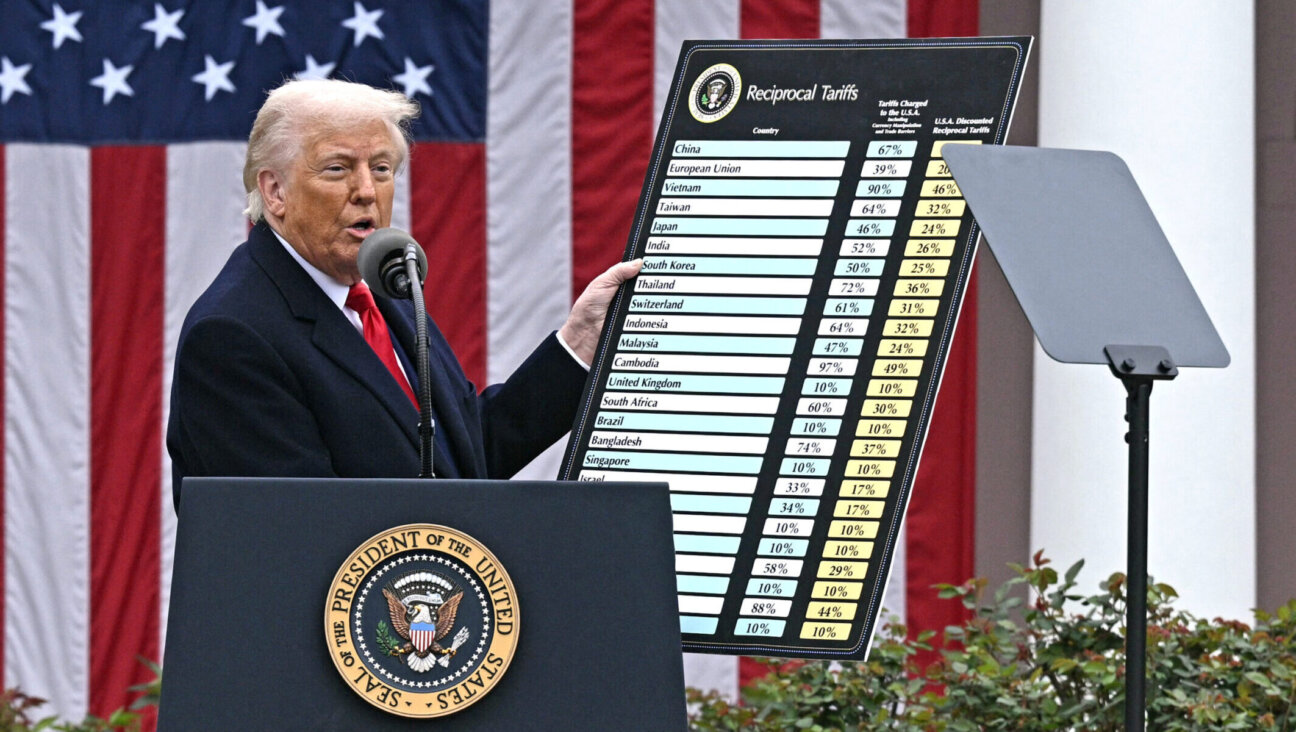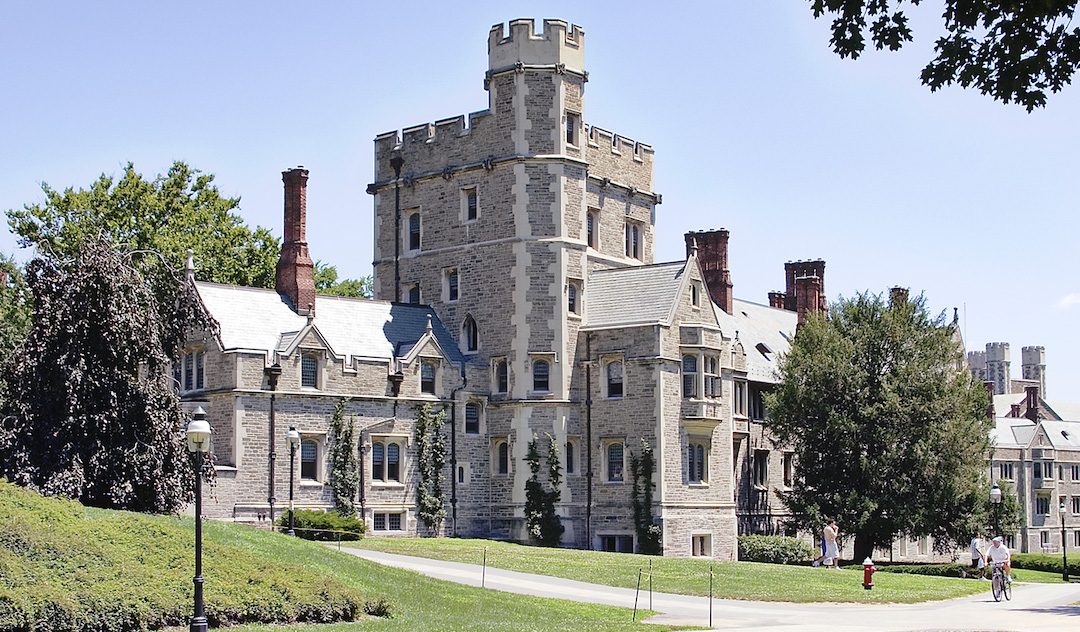GELT COMPLEX: Challenger Wins at EJC, GOP Reaching Out, Birthright Milestone, Aipac Launches Digest
Challenger Wins at EJC
In a watershed election, Russian tycoon Moshe Kantor won the presidency of the European Jewish Congress, marking the first time that an Eastern European has taken the reins of an international Jewish organization.
In the secret-ballot election, Kantor won 55 votes. The incumbent, Pierre Besnainou, won 30 votes in the bitterly fought election.
During his tenure, Besnainou had concentrated on European relations with Israel. Kantor, by contrast, stressed the need for the EJC to focus on such intra-European issues as education, culture and Jewish identity.
Kantor was aided by behind-the-scenes support from the newly elected head of the World Jewish Congress, Ronald Lauder. Lauder is a major philanthropic player in Eastern Europe, and Kantor supported him in the recent WJC elections. Lauder was in Brussels, and while he did not take any official position, sources said that Lauder worked to secure votes for Kantor.
Arie Zuckerman, a Kantor aide, told the Forward that the Russian had convinced delegates that he would favor team work rather than the “one-man show” of Besnainou.
In the end, the British, the Germans, the Scandinavians, the Dutch and the Swiss joined Central and Eastern European leaders in voting for Kantor.
After the vote, Besnainou told the Forward he believes that “Lauder played a big, big role and clearly supported Kantor.”
Before the elections, Besnainou publicly raised questions about Kantor’s closeness with Russian President Vladimir Putin, noting, for instance, that Russia was far more accommodating toward Hamas than Western European countries were. When asked about this by a French delegate, Kantor snapped that if there was such a close relationship with Putin, the Russian president was unaware of it.
— Marc Perelman
GOP Reaching Out
Republican leaders in Congress are reaching out to the pro-Israel lobby after anti-abortion politics led GOP lawmakers to oppose a bill that included $2.4 billion for the Jewish state.
The American Israel Public Affairs Committee lobbied hard for the $2.4 billion in defense assistance for Israel, as well as for another $40 million in refugee assistance that was included in the measure.
While the bill — and the money for Israel — was eventually approved by a Democrat-controlled congress, most Republicans in the House voted against the overall bill because it restored some funding for contraception aid to overseas groups that provide abortions. It was part of a larger $34.2 billion foreign operations bill. President Bush has sworn to veto the bill if it reaches his desk with funding for abortion providers.
In a memo urging a “no” vote on the foreign aid bill, House Minority Leader John Boehner, an Ohio Republican, went of his way to assure fellow Republican lawmakers that the GOP leadership was taking steps to reach out to Aipac. “Members are advised that the Leadership has drafted a letter to Aipac affirming Republican support for Israel funding, not withstanding final passage of this bill,” Boehner wrote in a P.S. attached to the memo that was sent to House Republicans.
— JTA
Birthright Milestone
New research released this week purports to show that the number of young American Jews who applied to participate in the Birthright Israel program is greater than the number who celebrated bar and bat mitzvahs this year.
Over the past 12 months, 44,675 Americans have applied to the Birthright program, which offers free 10-day educational trips to Israel for Jews between the ages of 18 and 26. Laurence Kotler-Berkowitz, director of United Jewish Communities’ research and analysis department, projects that between 29,000 and 31,000 American Jews celebrate becoming bar and bat mitzvah each year. (Kotler-Berkowitz used data from the National Jewish Population Survey of 2001, which has been criticized for undercounting the number of American Jews and the level of observance.)
“Taglit-Birthright Israel has become a new Jewish rite of passage, a new life cycle event onto [sic] itself,” said Jeffrey Solomon, president of The Andrea and Charles Bronfman Philanthropies. The Bronfman Philanthropies is one of the foundations that initially seeded the program.
The comparison between Birthright applications and bar and bat mitzvah figures is potentially misleading, because while it is generally only 12- and 13-year-olds who can celebrate the coming-of-age ceremony (with Orthodox females not taking part), any Jew between 18 and 26 can apply for Birthright. Moreover, many Jews who have been rejected reapply for future sessions.
While 44,000 have applied this year, funding limitations mean that only 12,000-18,000 can go in each of the summer and winter sessions. After this summer’s session, the program will have taken to Israel nearly 150,000 participants from more than 52 countries.
— Alana Newhouse
Aipac Launches Digest
In the latest salvo in the battle to sway the public debate over Israel, the American Israel Public Affairs Committee launched its own Middle East news digest that will be distributed to policymakers and journalists nationwide.
Aipac’s Daily News Digest, sent out for the first time this week, will be the third service providing summaries of news reports on the region. The longest-standing report is from the Jerusalem Center for Public Affairs, which distributes the Daily Alert through the Conference of Presidents of Major American Jewish Organizations. After years of complaints about the hawkish tone of that newsletter, last month the Center for American Progress launched a competing newsletter that took a more dovish approach.
The new Aipac digest, which has been in the works for months, gathers news from leading media outlets in America and Israel, and looks to draw a dividing line on the conflict. In its debut edition Monday, it featured a Wall Street Journal op-ed blasting congressional Democrats on Iraq. Another article, though, described Israel’s refusal of American calls for final-status peace talks with Palestinians.
— Nathan Guttman
The Forward is free to read, but it isn’t free to produce

I hope you appreciated this article. Before you go, I’d like to ask you to please support the Forward.
At a time when other newsrooms are closing or cutting back, the Forward has removed its paywall and invested additional resources to report on the ground from Israel and around the U.S. on the impact of the war, rising antisemitism and polarized discourse.
Readers like you make it all possible. We’ve started our Passover Fundraising Drive, and we need 1,800 readers like you to step up to support the Forward by April 21. Members of the Forward board are even matching the first 1,000 gifts, up to $70,000.
This is a great time to support independent Jewish journalism, because every dollar goes twice as far.
— Rachel Fishman Feddersen, Publisher and CEO
2X match on all Passover gifts!
Most Popular
- 1

News A Jewish Republican and Muslim Democrat are suddenly in a tight race for a special seat in Congress
- 2

Fast Forward The NCAA men’s Final Four has 3 Jewish coaches
- 3

Film & TV What Gal Gadot has said about the Israeli-Palestinian conflict
- 4

Fast Forward Cory Booker proclaims, ‘Hineni’ — I am here — 19 hours into anti-Trump Senate speech
In Case You Missed It
-

Fast Forward Trump’s ‘Liberation Day’ includes 17% tariffs on Israeli imports, even as Israel cancels tariffs on US goods
-

Fast Forward Hillel CEO says he shares ‘concerns’ over campus deportations, calls for due process
-

Fast Forward Jewish Princeton student accused of assault at protest last year is found not guilty
-

News ‘Qatargate’ and the web of huge scandals rocking Israel, explained
-
Shop the Forward Store
100% of profits support our journalism
Republish This Story
Please read before republishing
We’re happy to make this story available to republish for free, unless it originated with JTA, Haaretz or another publication (as indicated on the article) and as long as you follow our guidelines.
You must comply with the following:
- Credit the Forward
- Retain our pixel
- Preserve our canonical link in Google search
- Add a noindex tag in Google search
See our full guidelines for more information, and this guide for detail about canonical URLs.
To republish, copy the HTML by clicking on the yellow button to the right; it includes our tracking pixel, all paragraph styles and hyperlinks, the author byline and credit to the Forward. It does not include images; to avoid copyright violations, you must add them manually, following our guidelines. Please email us at [email protected], subject line “republish,” with any questions or to let us know what stories you’re picking up.














